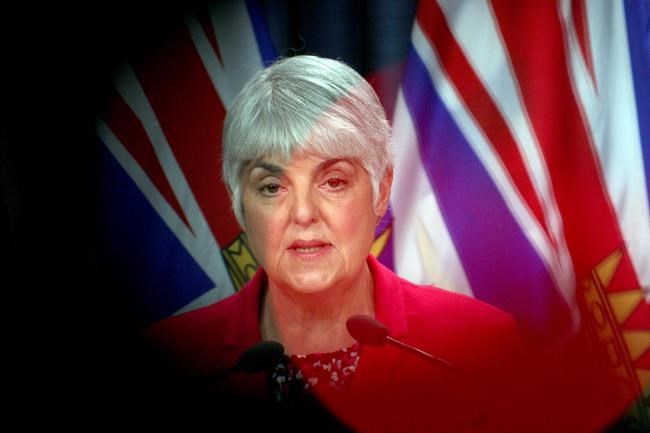The British Columbia government is counting on its $1.5-billion economic recovery fund to get the province through the turmoil of the COVID-19 pandemic, says Finance Minister Carole James.
James says she knows people are hurting as their finances are battered by the novel coronavirus, evident by the 16,000 people who applied for B.C.'s $1,000 tax-free emergency benefit in the first 45 minutes of the program going online on Friday.
"We all know that many British Columbians have lost their jobs or have had their ability to be able to work severely affected by COVID-19," James said at a news conference. "Businesses, large and small, are also struggling, wondering what the future is going to bring for their business or their industry."
Recent economic data from Central 1 Credit Union forecasts B.C.'s economy to plummet 7.3 per cent in 2020, eclipsing the depths reached during the recession in the early 1980s. Central 1 also forecasts a rebound of 5.1 per cent in 2021, but some key provincial industries, including tourism, will continue to flounder.
The C.D. Howe Institute's Business Cycle Council reported Friday Canada has entered a recession due to the economic devastation caused by the COVID-19 pandemic.
The council said the economy peaked in February before the steps taken to slow the spread of the coronavirus brought the economy to a standstill.
Premier John Horgan said earlier this week the indicators for B.C.'s economy "are dark for the foreseeable future." He said he is looking to provincial and federal relief measures to help B.C. endure the pandemic in the short-term.
Provincial health officer Dr. Bonnie Henry reported 33 new COVID-19 infections on Friday for a total of 2,145 cases.
One more person died, increasing the number of deaths to 112 people.
Henry said 1,357 people have now recovered from COVID-19.
James said the government introduced a $5 billion plan to help people, businesses and organizations affected by the pandemic. Part of that plan includes the $1.5 billion to help with recovery efforts.
"It is not going to be an easy process to look at coming out of the kind of challenges we faced with COVID-19," said James. "We need to make sure the return is done carefully. We're as eager to rebuild as you are."
She said she expected the premier to announce initial stages of B.C.'s economic recovery strategy next week.
Discussions have been underway between government, industry, business and labour officials about how best to target the $1.5 billion recovery dollars, she said.
"The money has not been committed yet," James said. "We are gathering plans now about how can we make sure that the money is going directly to supporting our economy and the kind of recovery we want to see."
Bryan Yu, deputy chief economist at Central 1, said the $1.5 billion fund will play an important role in B.C.'s economic recovery.
"With the current downturn, it's not going to be an immediate rebound or return to anything normal," he said. "As we move forward, we'll see how the economy ultimately evolves and rebounds, then we'll know where that funding needs to be addressed."
James said the $1,000 relief benefit is available to people in B.C. who are also receiving the federal Canada Emergency Response Benefit of $2,000 a month.
To get the B.C. benefit, people must have been a resident of the province on March 15, be eligible and approved to receive the federal benefit, be at least 15 years old on the application date, and have filed or agreed to file a 2019 tax return.
Those receiving provincial income or disability assistance are not eligible for the benefit.
This report by The Canadian Press was first published May 1, 2020.
Dirk Meissner, The Canadian Press



